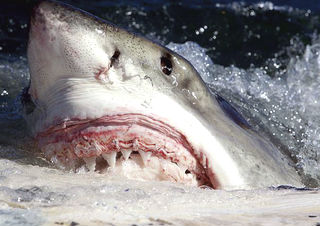Large predator fish play an important role in carbon cycling
Rebecca McCarthy 9/29/2015

Large predator fish like the Great White Shark may play an important role in carbon cycling. Image: Wikimedia, Fallows C, Gallagher AJ, Hammerschlag N (2013)a
Taking out great whites could be making the world a little warmer.
That’s the finding by marine scientist Rod Connolly of Australia’s Griffith University. Published in the journal Nature, his study says that keeping intact populations of predator fish is critical for salt marshes, mangroves, sea grass and other vegetated coastal habitats where carbon is accumulated and stored. It urges further study on these complex systems and research on the role of predators.
A summit this week in Australia, where there have been 13 shark attacks and one fatality this year, has brought 70 shark experts from around the world to Sydney to discuss ways to prevent casualties. New technologies hold the promise of reducing the number of interactions between humans and sharks. There seems to be little appetite in New South Wales, where the attacks occurred, for killing sharks.
Large predator fish: Environmental impact
Connolly believes that reducing the number of large predator fish through over-fishing or deliberate thinning could result in terrible environmental problems and affect how researchers combat climate change. Reducing the number of higher order predators cascades down through the food chain, affecting small animals that live in the mud of marshes and mangroves. It has been shown that coastal wetlands extract carbon from the atmosphere and bury it in the mud for hundreds or even thousands of years.
“When we change the abundance of higher order predators, this affects the number of smaller animals living in the mud, and that has flow-on effects for carbon storage in coastal wetlands,” says Professor Connolly.
Fisheries experts around the world have worked to manage how many fish are caught and eaten. All of these decisions, including ones about killing tiger sharks or great whites, have the potential to affect climate change.
The coastal wetlands that rim the continents of the world take a quarter of a trillion kilograms of carbon from the atmosphere every year. Large predators, Connolly has determined, also play a role in carbon cycling.
“The effect of the disproportionate loss of species high in the food chain cannot be underestimated,” he says.
For the full story, click here.
